
CITY HALL — Though gourmet food trucks have drawn criticism from some quarters for doing business on public streets, it turns out parking on private property is what’s illegal.
Santa Monica code enforcement officers shut down a group of food vendors who had set up for business on a privately owned lot this week, and on Thursday City Hall sent out a memo explaining the decision.
While the lot in question, located at Santa Monica Boulevard and 14th Street, is zoned for commercial use and could even be the future site of a McDonald’s, zoning code says “fast food uses that are not in an enclosed building are not permitted” anywhere in the city, according to the memo from Principle Planner Paul Foley.
The trucks are allowed to do business from legal parking spaces within the city as long as they have vending permits and don’t stay in a single location for longer than 30 minutes.
Steve Taub, who owns the lot, said through his attorney he plans to ask City Hall to change its ordinance to allow the food truck court to operate on his property. Four gourmet trucks were allowed to sell food at the lot on Monday and attracted 1,200 customers, organizers of the event said.
Land use attorney Howard Krom, who is representing Taub, said City Hall’s interpretation of the zoning code was “unreasonably restrictive.” He said since the trucks are allowed to operate in the city there should be a permit that allows them to operate on private land.
“It’s strange that you can do this on the street but you can’t do it under any circumstances on private property,” he said.
“It’s less disruptive and less disturbing to be on a regulated private property which is suitable for this use” than to be on the street in front of other businesses, he said.
The Bayside District Corp., which manages Downtown, has already raised concerns about food trucks stealing business from restaurants on and around Third Street.
Foley said if approached by Taub or the group of food truck vendors his office would start work on a proposed ordinance change.
“There’s no guarantee what our recommendation would be, but we’re certainly willing to work with them on their application if they wish to pursue it,” Foley said.
While the ordinance change process can take months, Krom said his client hopes to expedite the process.
“We think there’s a real community desire for [food trucks] not to be completely prohibited and relegated to the streets,” he said.
nickt@www.smdp.com







